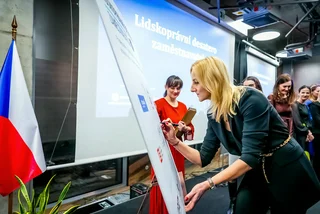Wealthy individuals and families must inevitably face the question of how to protect their assets for future generations. The passing down of assets across generations is a delicate affair, requiring careful planning and professional advice. For many families, putting assets into trusts provides a secure and effective solution.
While Czech trust funds are an increasingly popular vehicle for protecting assets, foreign alternatives have, in many cases, been relied upon for much longer. Expats.cz spoke to lawyer Aneta Šimice, a Senior Consultant at CCS Premium Trust, about the potential for international asset management to provide the security that clients need.
What are the options?
Multiple international asset management vehicles are available for clients based in Czechia, so choosing the right option without expert help can be intimidating.
“Many countries have their own legal entity for asset management or protection,” Šimice explains. “We mostly use Liechtenstein Foundations, although we also have experience with Liechtenstein Trusts and Anstalts, as well as British trusts and Jersey trusts. Trusts and foundations are available all over the world; in the US, trusts are very well-established, and each state has its own trust law. Interesting options in the EU include Hungarian trusts, while a new form of Polish foundation has also recently been created.”
Each option is different, and according to Šimice, the critical factor is the specific nature of assets. “Everything depends on the particular asset and where it is located,” she says.
All kinds of assets can be put into a trust or foundation, including property, businesses, cars, money, and valuable possessions; with such a wide range of possibilities, the advice of legal and asset management experts such as CCS Premium Trust is invaluable.
Who should consider a foreign trust?
Šimice points out that international vehicles such as Liechtenstein Foundations are particularly beneficial for expats living in Czechia, who may own assets in other countries or be tax-domiciled elsewhere. They’re also relevant for Czechs who own assets located in various foreign countries.
“Such foundations are suitable for foreign clients, but most importantly, it depends on where their assets are located. If they’re located all over the world, or mostly in countries other than the Czech Republic, then foreign vehicles will often be a better option than Czech trusts. They’re very popular with expats, but also with Czech clients who have assets abroad.”
“For a foreigner who doesn’t have a Czech tax domicile and who owns assets within and outside the EU, a Liechtenstein Foundation would be the most efficient solution,” Šimice adds.
For foreigners, a further advantage of using a Liechtenstein Foundation is that tax implications of asset distribution depend on the beneficiary's tax domicile, facilitating smoother administration and greater clarity. CCS Premium Trust advises clients on all tax implications and possibilities, helping to ensure that clients make the right decision to suit their specific needs.
“We always consider clients’ own views about what they need, and we start by asking clients about their assets and their intentions, collecting information about their companies and properties. We then analyze their needs from the legal perspective, taking into account the tax consequences of the various possibilities,” Šimice explains.
“After this, we make clear our reasoned, expert opinion about which options would be best, based on our in-depth analysis,” she adds.
Similarly to setting up a Czech trust, arranging an international vehicle such as a Liechtenstein Foundation should be done carefully, taking time to ensure that all parties implicated, including the asset owner, trustee and beneficiaries, are on board.
“The time investment required depends on the specific client. It’s possible for us to settle a Liechtenstein Foundation in a month, if the client is really in a rush, but we usually work with clients for several months, or even years in some cases,” Šimice says.
“It’s generally a little bit more expensive than creating a Czech trust, because we work together with international legal partners who are experts in their own jurisdictions.”
What are the benefits?
Czech trusts, which have been in existence since 2014, offer a high level of legal security and flexibility. At the same time, however, the relatively recent creation of Czech trust law contrasts with the long history of trusts and foundations in Liechtenstein, where trusteeship has been legally recognized since 1926.
This almost century-long history is a major attraction of Liechtenstein vehicles for foreign clients; the strength of the country as an asset management location provides additional security to those seeking to protect valuable assets.
“In Liechtenstein, clients benefit from the stable legal and economic environment. Liechtenstein Foundations and Trusts are very old, well-established vehicles backed up by a long case law history, which is more developed than with Czech trusts. From a legal perspective, you know what to expect with these kinds of vehicles,” Šimice points out.
“At the same time, Liechtenstein specializes in asset protection and management. With Liechtenstein Foundations, this includes a requirement that trusts or foundations feature a professional trustee, who must have specific qualifications and experience making them certified to act in this capacity. This provides additional assurance that Foundations will be managed properly.”
While Czech trusts are now growing in popularity, the effectiveness of foreign alternatives remains undimmed. According to Šimice, both types of asset management are becoming increasingly common, both among Czechs and among expats living in Czechia.
“The popularity of asset management is growing, in the Czech Republic and abroad. Czech trusts are becoming more common, but this certainly isn’t to the detriment of the foreign alternatives that we provide,” she says.
For expats in Czechia aiming to protect their assets, while potentially dealing with the added complications caused by an international lifestyle, foreign foundations and trusts may provide the perfect solution. Trusted international asset management vehicles with a long and proven history will, for many owners, provide the security they need when passing down assets to the next generations.
This article was written in cooperation with CCS Premium Trust Partner. Read more about our partner content policies here.












 Reading time: 4 minutes
Reading time: 4 minutes 






















